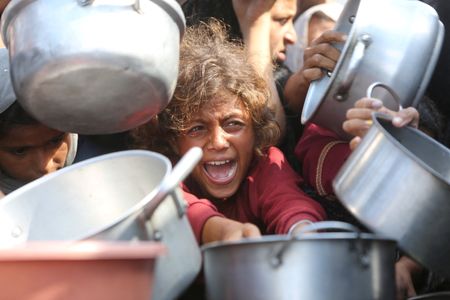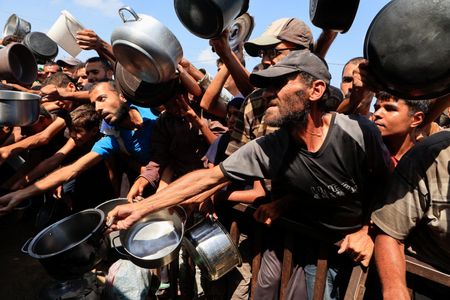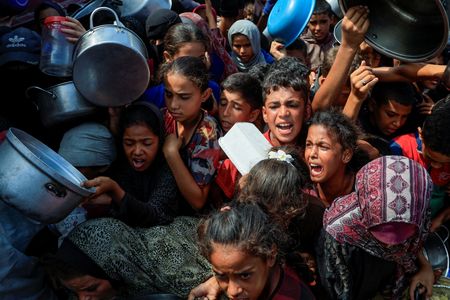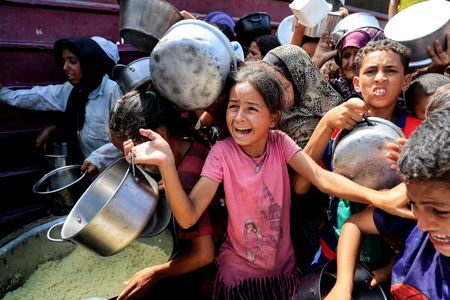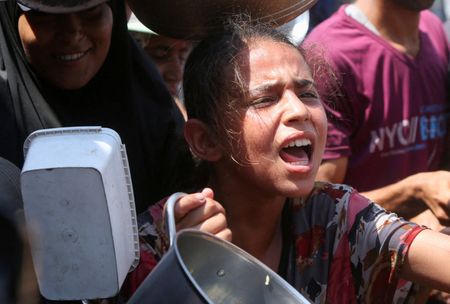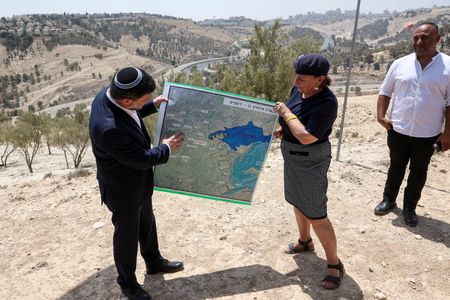By Michelle Nichols
UNITED NATIONS (Reuters) -Gaza City and surrounding areas are officially suffering from famine, and it will likely spread, a global hunger monitor determined on Friday, an assessment that will escalate pressure on Israel to allow more aid into the Palestinian territory.
The Integrated Food Security Phase Classification (IPC) system said 514,000 people – close to a quarter of Palestinians in Gaza – are experiencing famine, with the number due to rise to 641,000 by the end of September.
Some 280,000 of those people are in a northern region covering Gaza City – known as Gaza governorate – which the IPC said was in famine following nearly two years of war between Israel and Palestinian militants Hamas.
It was the first time the IPC has recorded famine outside of Africa, and the global group predicted that famine conditions would spread to the central and southern areas of Deir al-Balah and Khan Younis by the end of next month.
It added that the situation further north could be even worse than in Gaza City, but that limited data prevented any precise classification. Reuters has previously reported on the IPC’s struggle to get access to data required to assess the crisis.
“It is a famine that we could have prevented had we been allowed,” said U.N. humanitarian chief Tom Fletcher. “Yet food stacks up at borders because of systematic obstruction by Israel”
Israel dismissed the findings as false and biased, saying the IPC had based its survey on partial data largely provided by Hamas, which did not take into account a recent influx of food.
The report was an “outright lie”, said Israeli Prime Minister Benjamin Netanyahu. “It is a modern blood libel, spreading like wildfire through prejudice. History will judge those who peddle it,” he said in a statement.
For a region to be classified as in famine at least 20% of people must be suffering extreme food shortages, with one in three children acutely malnourished and two people out of every 10,000 dying daily from starvation or malnutrition and disease.
Previously, the IPC has only registered famines in Somalia, South Sudan and Sudan.
U.N. Secretary-General Antonio Guterres said the Gaza famine was a “man-made disaster, a moral indictment, and a failure of humanity itself”.
He called for an immediate ceasefire, the release of all hostages still held by Hamas and unfettered humanitarian access.
U.N. human rights chief Volker Türk warned that deaths from starvation could amount to a war crime.
DIPLOMATIC FALLOUT
Israel controls all access to Gaza. COGAT, the arm of the Israeli military that oversees aid flows, said the IPC report ignored Israeli data on aid deliveries and was part of an international campaign aimed at denigrating Israel.
“The IPC report is not only biased but also serves Hamas’ propaganda campaign,” the agency said.
In Israel, Hebrew-language news websites highlighted the famine report on their front pages, with the liberal Haaretz focused on the severity of starvation in Gaza City, while Israel Hayom, N12 and ynet emphasized Israel’s rejection of the report as biased and cited concerns over the possible diplomatic fallout.
Underscoring those worries, Britain called the IPC report “utterly horrifying” and demanded that Israel immediately allow unhindered supplies of food, medicines and fuel.
“The Israeli government’s refusal to allow sufficient aid into Gaza has caused this man-made catastrophe. This is a moral outrage,” British Foreign Secretary David Lammy said.
Britain, Canada, Australia and many European states recently said the humanitarian crisis had reached “unimaginable levels”.
Israel has long counted on the U.S., its most powerful ally, for military aid and diplomatic support. A Reuters/Ipsos poll released this week found that 65% of Americans believe the U.S. should help those starving in Gaza.
An erosion of U.S. public support would be a worrisome sign for Israel as it faces not only Hamas militants in Gaza but unresolved conflict with Iran, its regional arch-foe.
U.S. President Donald Trump last month said many people there were starving, putting him at odds with Netanyahu, who has repeatedly said there was no starvation.
FAMINE CLASSIFICATION
The IPC said the analysis released on Friday only covered people living in Gaza, Deir al-Balah and Khan Younis governorates. It was unable to classify North Gaza governorate due to access restrictions and a lack of data and it excluded any remaining population in the southern Rafah region as it is largely uninhabited.
The U.N. has complained of obstacles to delivering and distributing aid in Gaza, blaming impediments on Israel and lawlessness. Israel has been critical of the U.N.-led operation and accuses Hamas of stealing aid, which the militants deny.
It is the fifth time in the past 14 years that a famine has been determined by the IPC – an initiative involving 21 aid groups, United Nations agencies and regional organizations that is funded by the European Union, Germany, Britain and Canada.
The war in Gaza was triggered on October 7, 2023, when Hamas killed 1,200 people in southern Israel and took some 250 hostages, according to Israeli tallies. Since then, Israel’s military campaign has killed more than 62,000 Palestinians, according to Gaza health authorities.
The United States, Qatar and Egypt have been trying to broker an end to the conflict.
(Reporting by Michelle Nichols; Additional reporting by Emma Farge in Geneva, Lili Bayer and Maayan Lubell in Jerusalem and Howard Goller in New York; Writing by Michelle Nichols and Crispian Balmer; Editing by Don Durfee, Stephen Coates, William Maclean and Aidan Lewis)

